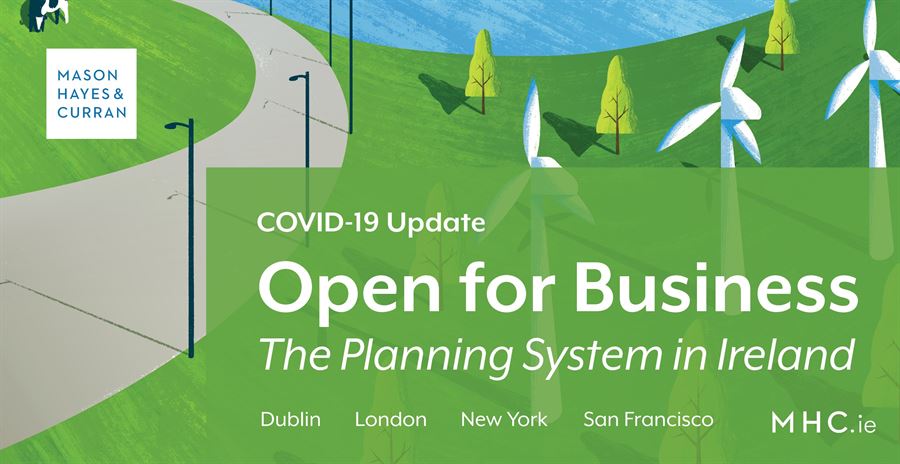
On 26 March the Minister for Housing, Planning and Local Government confirmed that the planning and building control systems remain open for business despite the introduction of restrictions across society in light of the COVID-19 crisis. This was addressed in our previous article here
On 30 March the Government agreed, at the request of the Minister, to make an order to public participation periods in the planning system for a period of three weeks.
Extension of time
The order adds 23 days to the statutory time periods for processing planning applications under the Planning Acts.
The statement from the Minister outlined the way in which this will impact on the time taken to process planning applications:
- If an application was lodged before 21 February 2020, the public participation phase is completed, and so a planning authority can make a decision within the extended deadline
- If an application was lodged after that date, but before 29 March 2020, the decision cannot be made until after 20 April 2020 to ensure that the public participation element has been completed
- If an application is lodged after 29 March 2020, it cannot be decided by the Planning Authority until the five-week period for public consultation on the application commences, which will now be after 20 April 2020
It was also decided that any public meetings associated with planning, or an appeal, will be deferred until the period of restricting the movement of the public has come to an end.
Planning system remains open
The Minister said that the decision is being made “to ensure that the integrity of decision making is upheld, and to ensure that plan making for new development can continue. Work will continue through these new restrictions so that the planning system is well placed to play its vital role in supporting the recovery.”
He stated that planning applications can continue to be made by post, and authorities can engage with applicants by electronic means, accepting submissions by post and electronic means. Most authorities have on-line systems for inspecting planning applications. The extended time will also apply to planning appeals, which An Bord Pleanála will continue to receive by post.
The offices of An Bord Pleanála will also remain open, albeit with reduced hours of access to members of the public. It is likely that some staff in planning departments of local authorities could be redeployed to other departments in the coming weeks in order to better manage resources. This may cause a delay in the processing of planning applications at the planning authority level, which depending on the length of such redeployment could have implications for throughput of planning applications generally.
Conclusion
There has been a significant effort on the part of the Irish Government to ensure that the planning system can continue to operate despite the general shutdown of large sections of the economy and significant impacts on wider public administration.
The measures which were announced on 30 March in effect ensure that there is no immediate shutdown of the planning system. Measures are not being introduced to freeze the system, but rather, to extend time periods in legislation to ensure the planning system will continue to operate in the face of the crisis. The emphasis has been on ensuring that work, if it can be undertaken appropriately, continues and that the system is ready to react and support social and economic activity once the crisis has passed.
While it remains too early to consider whether there will be significant impacts on the functioning of the planning system from the current crisis, the emphasis placed by government on maintaining the integrity of the planning system is to be welcomed, and is an indication of the centrality of that system to ensuring economic development and societal progress.
For more information on the likely impact of the current COVID-19 crisis on your business or operations, contact a member of our Planning & Environment team.
The content of this article is provided for information purposes only and does not constitute legal or other advice.




